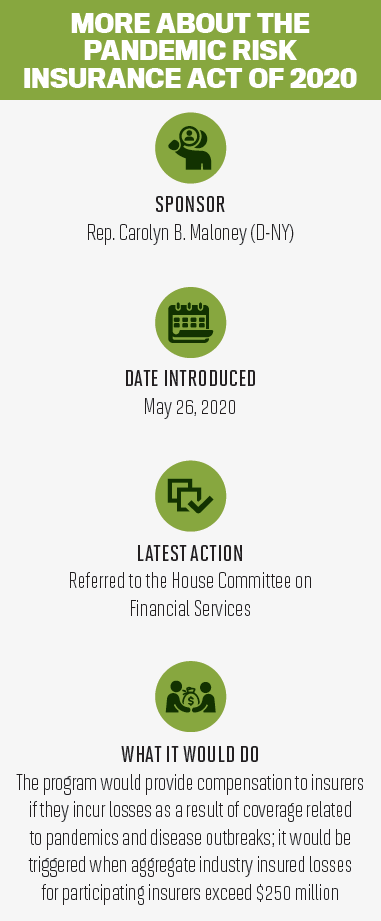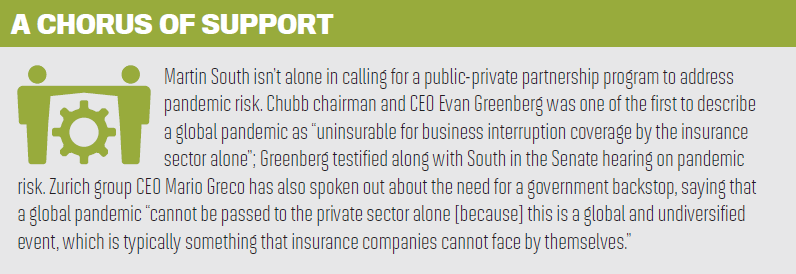

Martin South, president of Marsh US and Canada, has spoken out publicly about pandemic resilience and the necessity for public-private partnerships to address future health crises. On July 22, South served as a witness at the US Senate Committee on Banking, Housing and Urban Affairs’ hearing on how to address future pandemic risk.
“COVID-19 has affected every one of us personally and professionally,” South said in the hearing. “While the pandemic is first and foremost a human tragedy, we are deeply concerned about its impact on the global economy and on our clients.”
Marsh McLennan provides insurance brokerage and risk advisory services to nearly 170,000 businesses, nonprofit organizations and public entities in the US and Canada. The firm’s role, according to South, is “first and foremost to be an advocate for clients,” which is why Marsh McLennan is calling for a feasible public-private solution for pandemic risk.
Marsh McLennan’s expertise in pandemic far precedes COVID-19, South pointed out. “We have a longstanding involvement with the World Economic Forum’s annual Global Risks Report, which has long warned of the likelihood and potentially high impact of a global pandemic. In 2017, our company helped the World Bank structure the first-ever pandemic risk bonds. In 2018, Marsh developed an innovative insurance product, called PathogenRX, to provide pandemic business interruption coverage for key industries … We are also collaborating with international organizations to help mitigate the risk from vaccination programs for lower-income countries and regions.”
In addition, South said, Marsh McLennan has engaged in discussions with 40 governments worldwide since the start of the pandemic. “There is clear interest in many regions for government involvement in solutions at the country or even regional level,” he said, adding that it’s imperative to use the global experience from COVID-19 to help build stronger and more resilient economies ahead of the next pandemic.
Over the past year, it has become clear that property and liability policies “are severely limited in their ability to respond to pandemic- related losses,” South stressed. As such, many insurers are now excluding coverage for pandemic risk from all policies – and they’re expected to continue to do so in the future.
“ The magnitude of global economic losses; the difficulty in predicting what actions governments will take to contain infectious disease; and the potential for rapid, drastic changes in consumer demand make pandemic risk impossible for insurers and reinsurers to assume by themselves,” South said.
The magnitude of global economic losses; the difficulty in predicting what actions governments will take to contain infectious disease; and the potential for rapid, drastic changes in consumer demand make pandemic risk impossible for insurers and reinsurers to assume by themselves,” South said.
Marsh McLennan believes that certain parts of pandemic risk are insurable. South pointed to other catastrophic risks covered today by insurers, such as wildfire, earthquake, hurricane and the ever-increasing threat of cyberattacks.
“If we create the right economic incentives for insurers, policyholders and the government, insurance can serve its traditional function of mitigating risk,” he explained. “Over time, the right risk program can spur new technologies, ways of working, services, insurance products and processes to ultimately chip away at the enormous losses associated with pandemics. That, in turn, can help make pandemic risk more manageable and enable our economy to build the necessary resilience it needs for the future.”
South added that governments should leverage the insurance industry’s expertise to create a public-private partnership program that incorporates lessons learned from COVID-19 to build back stronger and protect against the future pandemics that will inevitably occur.
“There are many past examples of how governments and the private sector have come together to reduce risk and restore insurability, whether it be the establishment of fire brigades after the Great Fire of London of 1666 or the passage of the Terrorism Risk Insurance Act … in the aftermath of September 11,” he said, pointing out that the insurance industry and the government have a long and successful track record of partnering to enhance risk management techniques and increase society’s resilience.
Although pandemics have occurred many times, South noted that “the economic impact of COVID-19 has been of a different magnitude.” The potential severity of future pandemics once again calls on government action to create a public-private partnership program, he argued.
“The key to building a more proactive and agile response to the next pandemic will be an insurance and risk management partnership with the government that helps facilitate coverage, aligns the desires of both insurers and policyholders, and requires mitigation practices,” he said. “An efficient and effective pandemic insurance program will accelerate recovery and build resilience.”

